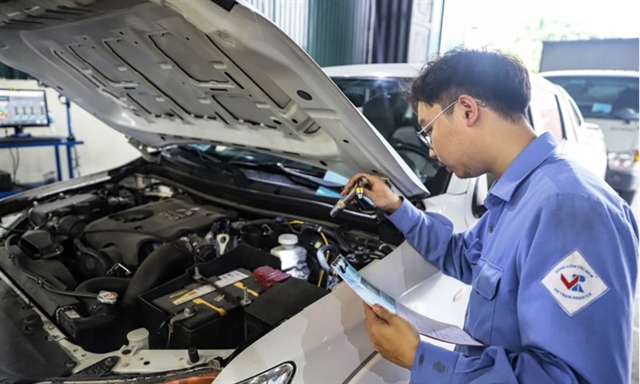.jpg) Opinion
Opinion

Dr Ngô Trí Long, former director of the Ministry of Finance’s Price and Market Research Institute, speaks to Thời báo Kinh tế Việt Nam (Việt Nam Economic Times) newspaper about the need for a thorough understanding of plug-in- hybrid vehicles and hybrid electric vehicles.
 |
| Ngô Trí Long, former director of the Ministry of Finance’s Price and Market Research Institute. — Photo cafef.vn |
Dr Ngô Trí Long, former director of the Ministry of Finance’s Price and Market Research Institute, speaks to Thời báo Kinh tế Việt Nam (Việt Nam Economic Times) newspaper about the need for a thorough understanding of plug-in-hybrid vehicles and hybrid electric vehicles.
What are the advantages of hybrid cars?
The advantages of hybrid cars are quite obvious for the environment, people’s health and consumers. That’s why hybrid cars have been selected by many nations as the future of the automobile industry. For example, on July 26, the UK released an announcement that from 2040 the country would ban the sale of petrol and diesel cars. Earlier, the French President also made public a similar plan to ban sales of petrol and diesel cars from 2040.
The benefits of hybrid cars are obvious. They don’t emit as much CO2 and cut petrol consumption.
It is undeniable that reducing exhaust emissions from vehicles aids people’s health. According to the World Health Organisation, in Europe, environmental pollution is the main cause of death for 13,000 children under four years old annually. So if we can bring toxic exhaust to European standards, we could save some 5,000 lives a year.
The other direct benefit I should mention is the low operation cost for users. For example, at the beginning, the cost of a hybrid car may be a bit higher than a normal car. But in the long run, its effectiveness will be much better as its running cost is lower than that of a petrol car. In addition, in many countries, users of hybrid cars enjoy preferential treatment, including in reduced taxes and fees.
Do you think that the Vietnamese Government should adopt similar policies for people using hybrid cars?
I couldn’t agree more! Our neighbours, China, Malaysia and some other Southeast Asian nations have already adopted policies on hybrid cars. That’s why Việt Nam should adopt a roadmap on the use of hybrid cars.
In the long run, we should not only import hybrid cars but also think of manufacturing or assembling hybrid cars here. This plan is in line with the Government’s sustainable development objectives.
The 2008 Law on Special Consumption Tax and the 2016 Revised Law on Special Consumption Tax reiterated Việt Nam’s policy of promoting the use of hybrid cars. However, in reality imported hybrid cars here have not yet been granted special tax cuts. Why is this?
A green economy is the goal of many countries and Việt Nam is no exception.
However, to turn the law into reality, the Government needs to play a special role. Though the Law on Special Consumption Tax was first adopted by the National Assembly in 2008 and was revised in 2016, it has not been fully implemented. In my opinion, the bottleneck is that law enforcement officials are confused about the definition of a plug-in-hybrid car and hybrid car. That’s why the Ministry of Finance has instructed customs officers to tax imported hybrid cars. It is time for the Government to instruct the ministry to accept the universal definition of a hybrid car as a “green car” so that importers of hybrid cars enjoy tax cuts.
Hybrid electric vehicles or green cars are the right choice for our economy and our current infrastructure. — VNS






.jpg)


